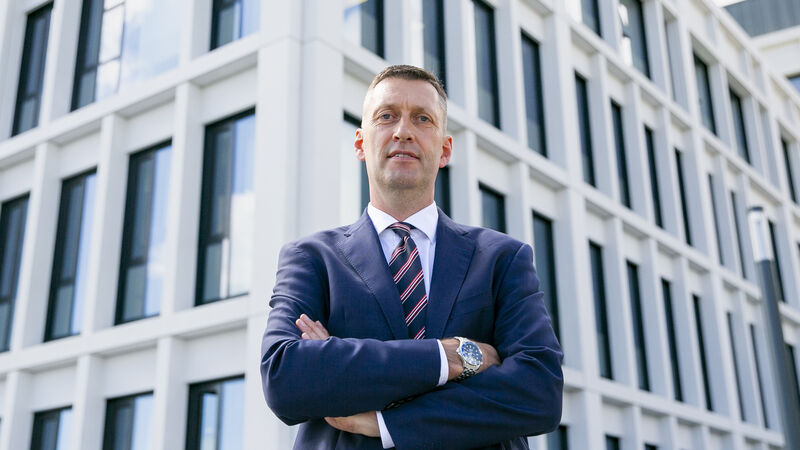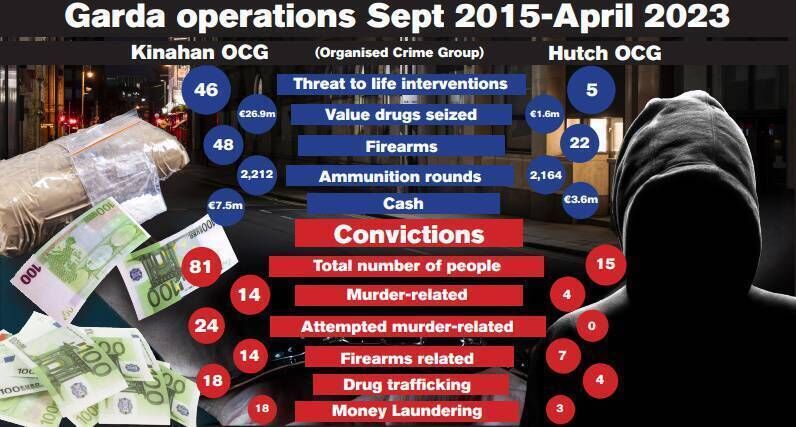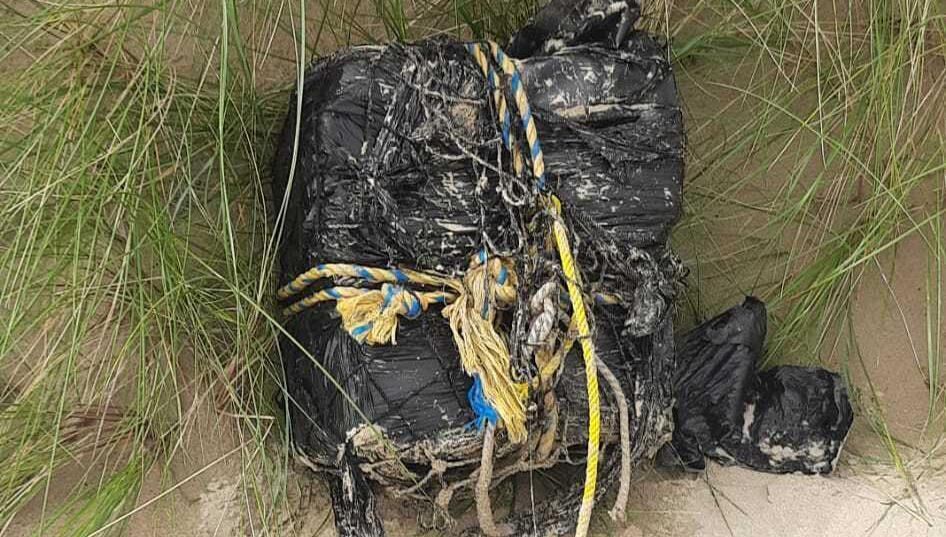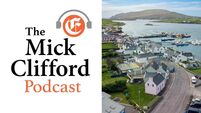Kinahan cartel 'no longer the dominant force it was once', says top garda

Assistant Commissioner Justin Kelly, head of organised and serious crime: The Kinahan and Hutch gangs ‘are just two organised crime groups, we have other OCGs. That is sort of lost on people. Our focus is on other groups and particularly emerging ones'. Picture: Gareth Chaney/Collins
Barely a week goes by without reports of massive and, in some cases, record seizures of cocaine across Europe, including Ireland.
Two weeks ago, Dutch authorities found eight tonnes of cocaine in Rotterdam port, the biggest to date. They were hidden in containers carrying bananas arriving from Ecuador.
In Ireland, 60kg of cocaine were recovered on August 5 inside a freight container which landed at Ringaskiddy Port, Co. Cork.
It was the second major haul in the port, after 54kg were found last April inside the refrigeration unit of a container which had come from Ecuador.
Last month, authorities in Germany found 10 tonnes of cocaine in the port of Hamburg, Italian agencies found five tonnes of cocaine off the Sicilian coast while 6.8 tonnes were seized in Brussels, Belgium.

July was a busy month too in Ireland. Some 40kg of cocaine were found inside two bales washed up on the Donegal coast which authorities suspect were dropped off from a vessel.
Also in July, Revenue officers in Rosslare made two massive hauls, the first a 163kg seizure inside a concealed roof of a trailer fridge unit and the second a 133kg consignment inside the roof of a horse box off a ferry.
Assistant Commissioner Justin Kelly, head of organised and serious crime, told the there was “no shortage” of cocaine, despite the seizures.
He said the glut of supply was met by what appeared to be an "insatiable appetite" for cocaine in Ireland and elsewhere.
He said that in Colombia, the source of around 60% of global cocaine supplies, there were “huge stockpiles of cocaine at all the different levels”, against the backdrop of a significant change in drug policies in the country.
A new government is moving away from the previous security-driven approach, which involved forced coca eradication, towards a voluntary approach and the potential legalisation of drugs.
The European Monitoring Centre for Drugs and Drug Addiction (EMCDDA) has been reporting “unprecedented” levels of cocaine production and cocaine seizures in recent years, with each year seeing new records.
In Ireland, Revenue has seized about 460kg of cocaine so far this year and An Garda Síochána around 170kg, bringing the total to around 630kg, with the agencies regularly working together. This compares to around 400kg for all of 2022.
These totals are just an indication of the amount of cocaine that may be destined for Ireland but is seized elsewhere in Europe under co-ordinated interventions by the EU Maritime Analysis and Operations Centre (MAOC).
Ireland has a garda and a Revenue officer working in the Lisbon-based agency.
Assistant Commissioner Kelly said that Ireland was involved in MAOC operations resulting in the seizure of 4.9 tonnes of cocaine so far this year.
The involvement could be either providing intelligence about a shipment or vessel or taking part in operations.
“This is a gigantic amount of cocaine and the information for that amount may have come from Ireland or a combination of countries — and that is just this year. It gives you an idea of the volume,” said Assistant Commissioner Kelly.
He visited the MAOC offices last month, coinciding with a MAOC operation in which Ireland and five other European countries assisted the French navy in the seizure of 376kg of cocaine off the French Caribbean island of Martinique.
He said he was impressed by the “analytical capability” of the agency, in “how vessels of interest are identified”, as well as the unique combination of military assets and police and customs.
He said the majority of cocaine was coming in through maritime containers, with the rest transported in vessels carrying consignments which drop off their loads around the coast of destination countries, as well as semi-submersibles, private airplanes, and commercial flights.
The Garda boss said private aircraft was a “growing trend”, with consignments landing in West Africa before being brought to Spain or France and then flown by small aircrafts to small private airfields.
He cited the seizure of 120kg of cocaine in an aircraft from France that landed in an airfield in Longford this time last year.
He said cartels were “always looking for new ways” to get drugs into Europe, but that containers were still the single biggest method used, adding that just 2% of maritime containers are checked.
A new trend he learned about in MAOC was that cartels are now using drones to transport bales of drugs from vessels off the coast of destination countries and bringing them onto solid ground.

Assistant Commissioner Kelly said that levels of violence witnessed in recent years in Belgium and the Netherlands, including the targeting and even murder of police, judges, solicitors, and journalists, illustrated the nature of the drugs trade and a reality gardaí wanted to prevent taking root here.
He also said they were alert to the threat posed by corruption of port workers seen in mainland Europe.
He said they took “really seriously” any information or intelligence, as flagged by the EMCDDA in July, of South American cartels diversifying away from the main ports of Rotterdam and Antwerp to other ports on the west coast of Europe, which the EMCDDA said could include Irish ports.
“It would be naive to think they won’t try and do that here.”
He said that Brexit has seen a significant increase in maritime traffic from northern Spain and France to Rosslare, as well as more traffic from Belgium and Netherlands, that was bound for Britain but coming through Irish ports.
He said some of the very large cocaine hauls in Rosslare could be bound either in full or in part for the North for onward shipment to Britain, due to no customs checks on the north-south border or between the North and Scotland.
All of this could see greater involvement of Balkan and Albanian gangs using Ireland.
Assistant Commissioner Kelly said he and the Garda Drugs and Organised Crime Bureau have held discussions with the British National Crime Agency (NCA) about Albanian gangs, which have become one of the biggest suppliers of cocaine to Britain.
“We have learned lessons from the NCA and we are trying to stay ahead of the game here.”
He said the Kinahan crime cartel is no longer the dominant force it once was and that it had been “substantially degraded” as a result of successive operations and investigations by Irish, British, Spanish, and US authorities, including the €15m bounty put out by American agencies in April 2022 for information leading to the apprehension of the three cartel leaders.
These investigations resulted in a seismic change in the level of co-operation between agencies in those countries and Ireland.
“It’s definitely strengthened our international partnerships, we have relationships that we never had before. We can now pick up the phone to them anytime day or night. A decade ago that would nearly be unthinkable.”
This has been greatly boosted by the expansion of garda liaison officers to Colombia, Dubai, and, soon, Asia.
He said the Kinahan leaders have “brought a huge amount of this attention on themselves”.
He echoed previous statements by Commissioner Drew Harris that gardaí will continue until the cartel is dismantled.
He said there are “still elements” of the cartel structure in Ireland, as there is in Dubai, and that it would be naive to think “they’re out of business”.
He is “confident that people at the top of that group will see justice”.
Assistant Commissioner Kelly said gardaí were aware that a large number of Kinahan people in jail are due to be released in the coming years, but cautioned against predictions that they will return to the cartel fold and restart the murderous Kinahan-Hutch feud.
He said the assassinations require significant logistics and a “huge amount of money” to fund them, adding that gardaí have made it “difficult” for the Kinahan leaders to fund or organise any such hit teams again.
On separate concerns among certain gardaí that it is the Hutch crime group who is planning revenge, particularly for the murders of innocent family members, friends, and associates, he said that if information on any such threat comes their way they will “obviously act on that”.
He also cautioned against people obsessing about the dominance of the Kinahan cartel, saying there are other high-level Irish gangs out there that have the international connections, including in South America, to traffic large shipments of cocaine and other drugs.
“They [Kinahan and Hutch gangs] are just two organised crime groups, we have other OCGs. That is sort of lost on people. Our focus is other groups and particularly emerging ones.”
Assistant Commissioner Kelly said the number and size of drug seizures they make is not necessarily their top priority.
"We have taken out key players and key facilitators, such as those involved in transport facilitation or money laundering, and they're a bigger priority.
"If we can disrupt the drug route and break it down and make big arrests, that's the priority."
He said information obtained in searches, including financial documents, information on phones or computers and on the movement of money, is gold.
This includes the hitting of cash houses, where cash is stored or counted.
"Cash is coming in pretty much non-stop, so if we take out one of these houses, it's not just the cash seized but we've given them a bigger problem, because they've got to find somewhere else."





